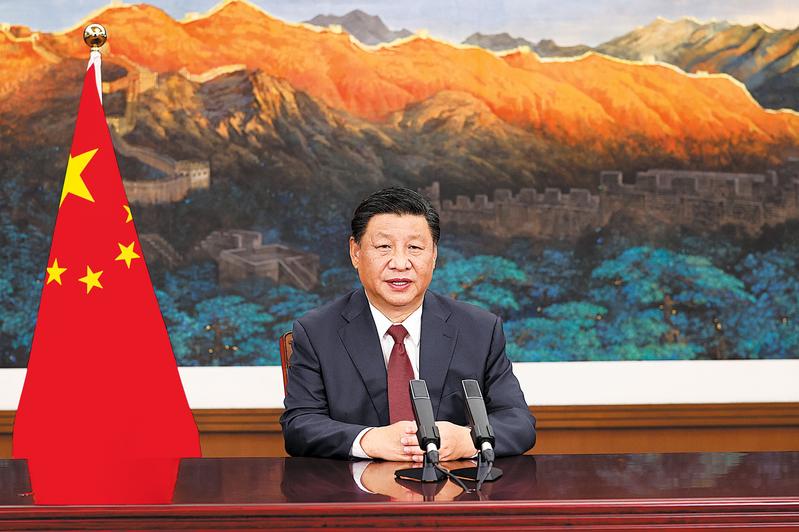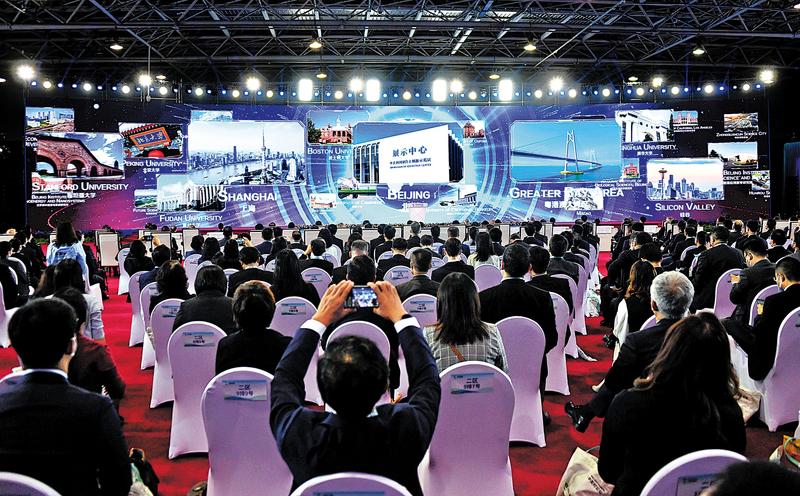 President Xi Jinping delivers a speech via video at the opening ceremony of the 2021 Zhongguancun Forum in Beijing on Sept 24. (HUANG JINGWEN / XINHUA)
President Xi Jinping delivers a speech via video at the opening ceremony of the 2021 Zhongguancun Forum in Beijing on Sept 24. (HUANG JINGWEN / XINHUA)
China will strengthen international exchanges on science and technology with a more open attitude, proactively take part in the global innovation network and jointly move forward with fundamental research, President Xi Jinping said on Sept 24.
In a speech delivered via video link at the opening of the 2021 Zhongguancun Forum in Beijing, Xi reaffirmed the nation’s commitment to scaling up protection of intellectual property rights, creating a top-notch climate for innovation and fostering the concept of using technology for good purposes.
With the broad and far-reaching influence of the COVID-19 pandemic and severe challenges facing global economic recovery, it is even more important for different nations to step up openness and innovation in science and technology and jointly explore pathways and methods to solve key global issues with innovation, Xi said.
The president stressed the need for a joint response to current challenges and jointly promoting the noble cause of peace and development of mankind.
A global vision is a prerequisite to developing science and technology in today’s world, and it is important to grasp the pulse of the times and closely focus on the new requirements of production and life, Xi said.
China attaches great importance to innovation in science and technology and remains committed to promoting global coordination in this regard, he said, adding that the nation will continue to promote the transformation of scientific and technological outcomes and foster new engines of economic growth.
Xi also underlined the importance of improving global governance in science and technology and further enhancing the well-being of mankind.
He pledged to support Beijing’s Zhongguancun, the nation’s first demonstration zone for independent innovation, in conducting a new round of pilot reform and expediting steps to develop itself into a leading global tech park.
The president expressed hope that participants at the forum — a national platform for global exchanges and cooperation in scientific and technological innovation — will conduct in-depth exchanges and contribute their wisdom to global innovation in science and technology and the building of a community with a shared future for mankind.
The Zhongguancun Forum, held under the theme of Intelligence, Health and Carbon Neutrality, was held from Sept 24 to 28.
Experts worldwide praised Xi’s speech at the event, saying the call for openness and collaboration in science and technology has pointed out the way for world economic recovery and sustainable development.
Xi’s call for global cooperation in technology is consistent with his broader vision of a community with a shared future for mankind, namely, to advance the good of the whole of humanity, said Peter Chang Thiam Chai, deputy director of the Institute of China Studies at the Kuala Lumpur-based University of Malaya.
Xi’s emphasis on collaboration was important because “there are countervailing forces pulling the world apart rather than drawing the global community closer as one human family”, he said.
Dennis Munene, executive director of the China-Africa Center at the Africa Policy Institute, a think tank based in Nairobi, Kenya, said Xi’s message also helps counter growing nationalism.
“Problems such as food security, healthcare and climate change amongst others are intertwined. Thus, science and technology have the potential to solve these pertinent global problems, bridge the gap between the developed and underdeveloped civilizations leading to economic growth and sustainable development,” Munene said.
 Participants at the opening ceremony of the 2021 Zhongguancun Forum, which highlights the application of new technologies, products and materials. (REN CHAO / XINHUA)
Participants at the opening ceremony of the 2021 Zhongguancun Forum, which highlights the application of new technologies, products and materials. (REN CHAO / XINHUA)
George Koo, a retired international business adviser in Silicon Valley, California, said science and technology has always been a global good and a global benefit, and advances made by anyone sooner or later are shared by everyone.
“It only became less true in recent years, because the United States started to act like ‘China was only interested in stealing technology from the US’, and not recognizing that China has as much to offer in technological advances and innovations as the US,” Koo said.
“What President Xi says makes a whole lot of sense, if you put the geopolitics aside, because sharing technology is sharing know-how between the people in the world. And by sharing, you can help each other, making more advances on top of advances. So the benefit is for everybody.”
Andrei Ostrovsky, head of the Institute of Far Eastern Studies at the Moscow-based Russian Academy of Sciences, said, “China has consistently advocated the creation of an open, fair and non-discriminatory environment for global scientific and technological cooperation.”
China has had tremendous achievements in fields such as information technology, 5G and space exploration, he noted.
Chang, from the University of Malaya, said, “As the world stands at the doorstep of a new industrial revolution that is expected to radically change our way of life, China can provide the global leadership to guide humankind toward this new scientific era and exciting technological frontier.”
Raquel Isamara Leon de la Rosa, professor and researcher of international business at the Meritorious Autonomous University of Puebla in Mexico, said China is growing to become a technology-oriented economy.
Technologies such as artificial intelligence, green energy and carbon neutrality showcased at the Zhongguancun Forum have drawn worldwide attention, De la Rosa said.
Xu Qiang, head of the Beijing Science and Technology Commission, who listened to the speech at the opening ceremony, said he was encouraged to learn that Beijing will strengthen science and technology innovation and actively integrate with the global innovation network.
Ren Changrui, executive vice-president of the Beijing Academy of Blockchain and Edge Computing, said he felt inspired after hearing Xi’s speech.
Blockchain is a technology that promotes trust and connection, and the development of blockchain is inseparable from international exchanges and cooperation, Ren said.
Tong Zhaohui, vice-president of Beijing Chaoyang Hospital, said he will enhance scientific and technology innovation and apply the results to medical work.
“We will increase cooperation with the world and actively conduct research on COVID-19 vaccines and epidemic prevention to ease the problem,” he said.
Launched in 2007, the Zhongguancun Forum is held in Beijing’s Zhongguancun area in Haidian district, which is home to many top universities, research institutions and high-tech companies.
Yuan Jinhui, founder and CEO of Beijing OneFlow Technology, said he believes more unicorn companies — startups valued at over $1 billion — will be created in Zhongguancun.
“Xi has sent a clear message to technology-driven startups like us,” said Yuan, who founded his company in Haidian district in 2017 with the aim of developing an intelligent learning platform.
“As a professional in science and technology, we need to focus on the future and create quality products through technology and innovation, to solve problems and seek the future for humanity.”
Yuan said Zhongguancun has an environment that encourages enterprises to do fundamental research.
“Like a fertile soil, the Zhongguancun area ensures that innovative companies like us that need long-term underlying growth in software technology can grow steadily,” he said.
Jia Jingdun, director of the Torch High Technology Industry Development Center under the Ministry of Science and Technology, noted that this year’s forum was hosted at a much higher level, and its representatives have focused on cutting-edge technological breakthroughs.
He said the forum is an opportunity to take opening-up to a higher level, and the partnerships and exchange mechanisms forged at the event will have a much deeper influence in the future.
Pan Jiaofeng, dean of the Institutes of Science and Development at the Chinese Academy of Sciences, said it is important to bring together global resources and gather wisdom.
Scientists “could apply more open methods to give full play to the advantages of professional think tanks and conduct research on future technology industry models, which will play a supporting role in decision-making on future industry development strategies”, he said.
Yang Ran in Beijing and Xinhua contributed to this story.
Contact the writers at xuwei@chinadaily.com.cn


